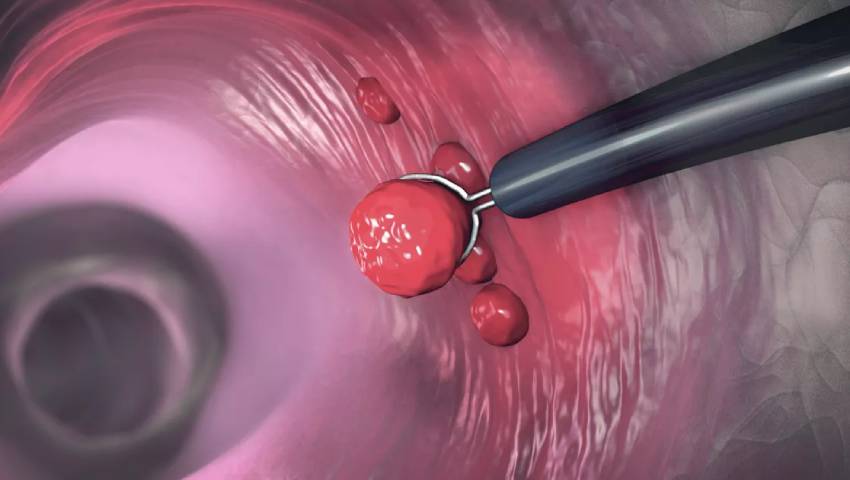
- 26/11/2024
- Dr. Samrat Jankar
- 0 Comments
- Blog
Understanding the Difference Between Colon Polyps and Colon Cancer
Colon polyps and colon cancer are both diseases that affect the colon, but they differ significantly in their nature, potential risks, and treatment options. Dr. Samrat Jankar, a leading gastroenterologist and gastrointestinal surgeon in Pune, explains the key differences between these two conditions, which are essential for prevention, early detection, and effective management.
What Are Colon Polyps?
Colon polyps are growths that form on the inner lining of the colon or rectum. While most polyps are benign (non-cancerous), some have the potential to develop into colon cancer over time. Polyps vary in size, shape, and type, and there are different types, containing:
- Adenomatous Polyps (Adenomas): These are the most common type and are considered pre-cancerous. If left untreated, adenomatous polyps may eventually turn into colon cancer.
- Hyperplastic Polyps: Normally small and considered low-risk for cancer.
- Inflammatory Polyps: Often associated with inflammatory bowel diseases like ulcerative colitis and Crohn’s disease.
- Serrated Polyps: These may also have cancerous potential, specifically when located on the right side of the colon.
What is Colon Cancer?
Colon cancer, or colorectal cancer, is a malignancy that forms in the colon or rectum. It usually starts as small, benign clumps of cells known as polyps that may develop into cancerous growths over time. Colon cancer can be aggressive and spread to other parts of the body if not detected and treated early.
Key Differences Between Colon Polyps and Colon Cancer:
Nature of Growth:
- Polyps: These are typically benign growths with the potential to become cancerous over time, but they are not cancerous in themselves.
- Colon Cancer: Colon cancer is a malignant (cancerous) growth that can invade surrounding tissues and spread to other organs.
Risk Factors:
- Polyps: Certain types of polyps (especially adenomatous) increase the risk of developing colon cancer. Risk factors for polyps include age, family history, inflammatory bowel disease, and a diet high in fat.
- Colon Cancer: Risk factors for colon cancer include a family history of cancer, inflammatory bowel disease, smoking, a sedentary lifestyle, and poor diet, particularly one low in fiber and high in red or processed meats.
Symptoms:
- Polyps: Early-stage polyps may not show any symptoms. As they grow, they may cause rectal bleeding, changes in bowel habits, or abdominal pain. However, these signs are often not noticeable until the polyp has become larger or cancerous.
- Colon Cancer: Symptoms of colon cancer can include unexplained weight loss, fatigue, ongoing abdominal pain, blood in the stool, and changes in bowel habits such as diarrhea or constipation.
Detection:
- Polyps: The best way to detect colon polyps is through routine screening methods such as colonoscopy, which can identify polyps before they turn into cancer. Other screening tests include flexible sigmoidoscopy, stool tests, and virtual colonoscopy.
- Colon Cancer: Like polyps, colon cancer is typically detected through colonoscopy or imaging studies if signs develop. Early-stage colon cancer may be found incidentally during routine screening for polyps.
Treatment:
- Polyps: Most polyps can be removed during a colonoscopy, preventing them from progressing into colon cancer. Regular monitoring is needed to ensure that new polyps do not develop.
- Colon Cancer: Treatment for colon cancer relies on the stage and may involve surgery, chemotherapy, radiation therapy, or a combination of these. Early-stage cancer has a high cure rate, specifically when detected before it spreads.
Why Early Detection is Key?
The good news is that colon polyps can be detected and removed before they have a chance to develop into colon cancer. Regular screenings, starting at age 45 or earlier if there’s a family history of colorectal cancer, are essential in preventing colon cancer. If colon cancer is diagnosed early, the chances of successful treatment and recovery are significantly improved.
Dr. Samrat Jankar emphasizes the importance of preventive care and early detection. Routine screenings can save lives by recognizing problems early when they are most treatable. For individuals at higher risk, earlier or more frequent screening may be required.
Conclusion:
While colon polyps and colon cancer are related, they are distinct in their nature, risk, and treatment. Colon polyps, especially the adenomatous type, have the possibility to turn into cancer if not managed. On the other hand, colon cancer is a malignant condition that requires more intensive treatment. Regular screenings and early intervention are crucial in preventing the progression of colon polyps to cancer.
If you are due for a screening or have concerns about your colon health, consult with a qualified colorectal surgeon in Pune like Dr. Samrat Jankar. With early detection and proactive management, colon cancer is a highly preventable condition.
